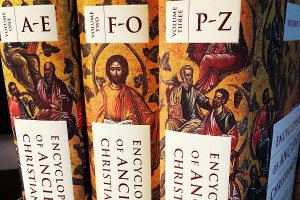 His name was Encyclopedia Brown. He was a protagonist of about 10 years old who in my third grade year I thought was the most interesting character in story. And I was a boy who cared little for reading. It has been many years since third grade and to be hones I’ve only thought about that hero in elementary school book fair books only occasionally in the 3 decades since. But if I would guess, I think the whole idea behind Encyclopedia Brown was to encourage young boys like me to value the importance of reading for learning. Encyclopedia Brown was able to solve mysteries because he recalled things he had learned through reading. And his name designated one of our best genres for learning, an encyclopedia. Since those elementary school days, I knew that an encyclopedia was a useful tool to have around. If for no other reason than you never knew when you bump into a mystery that needed solving.
His name was Encyclopedia Brown. He was a protagonist of about 10 years old who in my third grade year I thought was the most interesting character in story. And I was a boy who cared little for reading. It has been many years since third grade and to be hones I’ve only thought about that hero in elementary school book fair books only occasionally in the 3 decades since. But if I would guess, I think the whole idea behind Encyclopedia Brown was to encourage young boys like me to value the importance of reading for learning. Encyclopedia Brown was able to solve mysteries because he recalled things he had learned through reading. And his name designated one of our best genres for learning, an encyclopedia. Since those elementary school days, I knew that an encyclopedia was a useful tool to have around. If for no other reason than you never knew when you bump into a mystery that needed solving.
What’s the point? For a Christian personal library, even a modest one, encyclopedias are a foundational. And are worth the investment over the more flashy books that roll out of publishing houses weekly. Every week it seems these days we read about books that are “must reads” on blogs and other social media. Many times, even if these books are interesting and useful, they become quickly dated. Occasionally when I’m sorting through books, I come to one and think myself, why did I think I needed this? It’s just taking up shelf space. But this thought hardly ever crosses my mind when I comes to dictionaries and encyclopedias. While they may be occasionally updated or replaced by a better one, these resources stand the test of time and are a much more trustworthy and relevant resource.
This is no more the case than IVP’s release of the Encyclopedia of Ancient Christianity. The three-volume work is a comprehensive resource for the Christianity from A.D. 90-750. Originally the second edition of the Italian Dizionario edited by Casa Editrice Marietti and published between 2006-2010, the Encyclopedia contains 3220 articles written by 266 contributors from 26 countries. The articles cover topics such as archaeology, geography, history, philosophy, and theology. Thomas Oden one of the consulting editors and author of the preface to this second English edition says of the work:
The sheer mass of scholarly work on early Christianity is astounding. New studies with new methods have been included. These contributors, along with the English translation teach of Joel Elowsky and James Hoover, are offering an unrivaled resource in English for scholars around the world. The purpose of an encyclopedia is to condense massive information about locations, figures, interpretations and subjects into a suitably concise format commensurable with the importance of the subject. Its goal is succinct summaries of complex data, offering an impartial, fact-based summation of diverse scholarship along with bibliographies to guide readers further into the vast literature.
This encyclopedia is a worthwhile investment for a personal library. It would be better to invest in it than to have purchased and read 10 of the latest trendy books.











